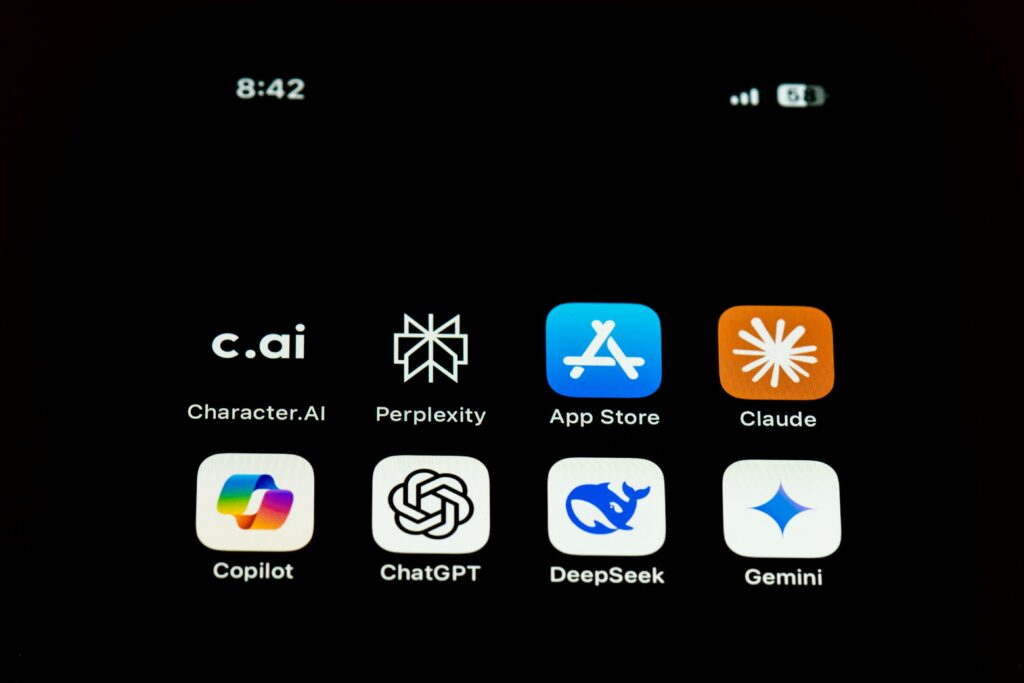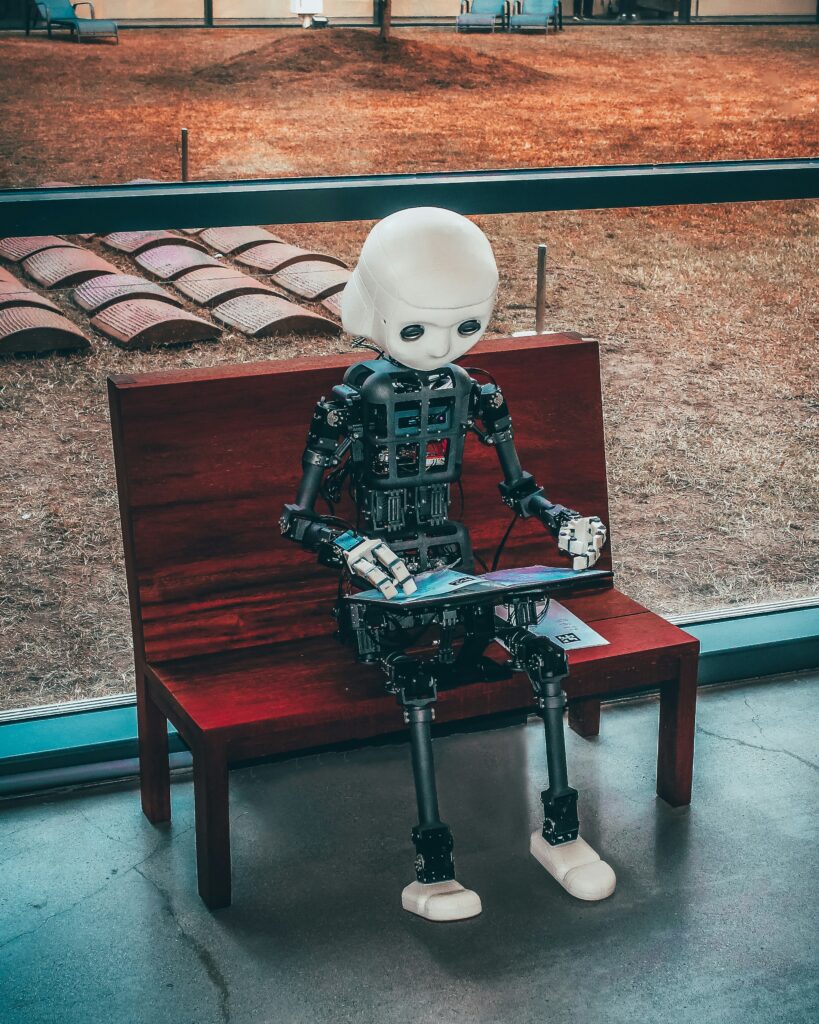Lawal Ibraheem Olaniyi, Graduate, Mechanical Engineering, Nigeria

Is this the beginning of the end? Every decade comes with moments that make us wonder whether human civilisation is teetering towards a major catastrophe. From the stories of world war and climate change to political instability and technological shift, it’s easy to feel like the world is coming to an end. But is this really the beginning of the end or merely the next phase in the era of human evolution?
In this article we dive deep into the current trends in Artificial Intelligence (AI) development, ethical considerations, and the Islamic perspective on its development.
The rise of AI and global ambitions
Artificial Intelligence is no longer a futuristic concept; it’s a present reality. The United States and China are at the forefront of a new global race to dominate AI, sparking debates on its benefits and risks.
Just last month, President Donald Trump was sworn-in as the 47th President of the United States, succeeding former President Joe Biden. Days later, he announced a $500 Billion “Stargate Project” – an ambitious AI project that seeks to build massive data centers across the United States. Although the details of the project are still ambiguous, one thing remains certain – the US aims to lead the world in the AI marathon.
Meanwhile, China’s tech industry is also making waves. A Chinese startup recently released DeepSeek-R1, an open-source AI model that rivals OpenAI’s ChatGPT-4. Jose Antonio, a tech analyst, highlights its ability to outperform ChatGPT on several benchmarks, noting its significantly lower cost of $0.14 per million tokens compared to OpenAI’s $7.50. The model’s release has sparked reactions from netizens, and even caused stock markets to crash at one point, contrasting its performance to the OpenAI’s model and its affordability.
AGI: Promise or peril?

The rise of AI is no news anymore. In fact, we are slowly entering the era of Artificial General Intelligence (AGI), a type of AI capable of matching or even surpassing the human-level intelligence across a wide range of cognitive task. Open AI CEO, Sam Altman, who spearheads the Stargate Project, recently announced the company’s plan to release its “first AI agent”, which he describes as the “most powerful technology in human history”.
The development of AI, and more recently AGI, is like a double-edged sword, with both a promising future and a potential peril in the history of human existence. The capabilities of AI are now beyond our thoughts and it’s able to perform astonishing tasks. In an article by Will Douglas, a tech analyst, he explains the operation of ‘Operator’, the first AI agent released by OpenAI. It could perform certain online tasks such as booking tickets, making reservations, and filling an online grocery order – all by taking screenshots of the computer screen, scanning the pixels and interacting with the buttons in it.
However, these advancements come with concerns. Privacy infringement, misinformation, and unregulated use are just a few risks that worry experts. In an interview with BBC Newsnight, Geoffrey Hinton, the godfather of AI, expressed concerns about the unregulated development of AI which he calls “an existential threat”. Hinton believes the modern large language models we have are much more powerful than we think. He illustrates this by explaining why he thinks they are a “superior form of intelligence”.
“Imagine you can make many copies of the same neural network [say 10,000], each copy can look at a different bit of data and they all share what they learn with each other. He compares this to having 10,000 individuals, each earning a different degree and sharing their knowledge with the other 10,000. Imagine how intelligent they would become”, Hinton adds. Unfortunately, this is impossible for humans but possible for neural networks.
Similarly, in an exclusive interview with Business Insider, Yoshua Bengio, a Canadian research scientist, who alongside Geoffrey Hinton and Yann LeCun, is considered a godfather of AI, warns about the risk of agentic AI.
“All of the catastrophic scenarios with AGI or Superintelligence happen if we have agents […]. If we build non-agentic AI systems, they can be used to control agentic systems”, Bengio told BI in the interview.
During a panel session on AI safety, Bengio also calls the development of AI agents “a red flag” and “the most dangerous path”. He however highlighted that it is possible to use AI in beneficial ways – like scientific discoveries – which do not require agentic systems such as the DeepMind’s breakthrough in protein folding.
AI: The dark side
In a video posted by Charlie Holtz, a programmer, on his X’s page, he shares his experience using the GPT-4 + vision @elevenlabs model where the AI model mimics the voice of David Attenborough, a British broadcaster and biologist, and narrates Holtz’s life. This video took the best of social media, garnering several reactions, with netizens commending the AI model’s performance.
Just a week after this incident, Sir David Attenborough – the real one – raised concerns on how this AI could potentially deceive people into believing that he is saying things contrary to his belief. David Attenborough finds the AI version of himself personally distressing. This clearly outlines one of the potential misuse of Generative AI in deepfake technology.
We also see recent allegations towards Meta’s CEO, Mark Zuckerberg, who was accused of using pirated content to train its AI models. This follows a legal action filed against him in 2022, for allowing Cambridge Analytica to harvest Facebook users data without their consent using AI algorithms. Experts raise concerns over AI and data privacy breaches.
Nick Robins-Early, a tech analyst, also confirms several instances of weaponised AI systems currently being used in the wars happening around the world. For instance, China is currently developing weaponised robot dogs, and armed drones in the Russia-Ukraine war are being used.
Several nations are now using the war zone as a testing ground for their AI systems, which raise urgent questions about the unregulated deployment of AI in warfare.
Islamic ethics on the development of AI
In light of these concerns, it is essential to consider the ethical guidelines provided by the teachings of Islam. The Holy Quran encourages the study of nature and the use of knowledge for the benefit of humanity:
اَوَلَمۡ یَتَفَکَّرُوۡا فِیۡۤ اَنۡفُسِہِمۡ ۟ مَا خَلَقَ اللّٰہُ السَّمٰوٰتِ وَالۡاَرۡضَ وَمَا بَیۡنَہُمَاۤ اِلَّا بِالۡحَقِّ وَاَجَلٍ مُّسَمًّی ؕ وَاِنَّ کَثِیۡرًا مِّنَ النَّاسِ بِلِقَآیِٔ رَبِّہِمۡ لَکٰفِرُوۡنَ
“Do they not reflect in their own minds? Allah has not created the heavens and the earth and all that is between the two but in accordance with the requirements of wisdom and for a fixed term. But many among men believe not in the meeting of their Lord.” (Surah ar-Rum, Ch.30: V.9)
Yet, the Holy Quran warns humanity to not orchestrate its own destruction:
وَلَا تُلۡقُوۡا بِاَیۡدِیۡکُمۡ اِلَی التَّہۡلُکَۃِ
“[…] and cast not yourselves into ruin with your own hands” (Surah al-Baqarah, Ch.2: V.196)
An apt analogy for humanity orchestrating its own destruction is the Manhattan Project, which led to the creation of the first atomic bomb. Even Robert Oppenheimer, the scientist behind its development, expressed deep regret after learning about the devastating effects of the bomb.
In a similar vein, the pioneers of artificial intelligence are now raising concerns about its rapid development. With the alarming rise of AI, it seems as though history is about to repeat itself.
Allah the Almighty has created us with freewill. He further blessed us with faculties to distinguish right from the wrong:
وَہَدَیۡنٰہُ النَّجۡدَیۡنِ
“And We have pointed out to him the two highways [of good and evil].” (Surah al-Balad, Ch.90: V.11)
In a similar manner, the Promised Messiahas has emphasised the use of God-given faculties at the appropriate time and place. (Malfuzat [2018], Vol. 1, p. 34)
The Holy Quran also particularly emphasises the significance of verifying information:
يَـٰٓأَيُّهَا ٱلَّذِينَ ءَامَنُوٓاْ إِن جَآءَكُمۡ فَاسِقُۢ بِنَبَإٖ فَتَبَيَّنُوٓاْ أَن تُصِيبُواْ قَوۡمَۢا بِجَهَٰلَةٖ فَتُصۡبِحُواْ عَلَىٰ مَا فَعَلۡتُمۡ نَٰدِمِينَ
“O ye who believe! if an unrighteous person brings you any news, ascertain [the correctness of the report] fully, lest you harm a people in ignorance, and then become repentant for what you have done.” (Surah al-Hujurat, Ch.49: V.7)
This verse is particularly relevant in this modern era where there is countless fake information all over the internet.
The Holy Quran also urges human to reflect upon their actions:
وَاِذَا تَوَلّٰی سَعٰی فِی الۡاَرۡضِ لِیُفۡسِدَ فِیۡہَا وَیُہۡلِکَ الۡحَرۡثَ وَالنَّسۡلَ ؕ وَاللّٰہُ لَا یُحِبُّ الۡفَسَادَ
“And when he is in authority, he runs about in the land to create disorder in it and destroy the crops and the progeny [of man]; and Allah loves not disorder.” (Surah al-Baqarah, Ch.2: V.206)
The meaning of this verse can also be extended to the superpower nations; that they should reflect upon their actions. Unregulated AI development without ethical oversight can in fact lead to significant harm for the human race. This calls for the need for a balanced approach in the development and use of AI.
During a mulaqat with the Alislam website team, Huzoor-e-Anwaraa emphasised the significance of human oversight in the responsible use of AI. He further advised that all information generated through the use of AI, most especially relating to the Jamaat, need to be edited and analysed to ensure they are written correctly. Huzooraa also cautioned its potential misuse and the responsibility to develop a preventive measure to avoid dissemination of wrong information.
In another mulaqat, while speaking about AI, Huzooraa encouraged Ahmadis to conduct deeper research on the subject. He shared an example where a sentence was provided to an AI, but it mistranslated the content. Despite this shortcoming, Huzooraa did not condemn the use of AI; instead, he emphasised the significance of thoroughly assessing the information it generates to ensure accuracy and reliability.
A call for responsible AI
As AI continues to evolve, humans stand at a crossroad. Although the potential for scientific discovery and societal benefit is huge, the risks of unregulated development cannot be neglected. Ethical considerations, such as privacy, fairness, and accountability, must guide the use and development of AI. As such, in other to mitigate the risk of AI development, it would be wise to take some safety measures:
- Transparent Model Development: Documenting systems’ design, training processes, and decision-making pathways is crucial for identifying and addressing potential biases in AI systems.
- Robust Governmental Regulations: Government agencies need to enact laws that ensure companies that develop AI are thoroughly monitored to ensure all AI models developed meet with the AI regulations and guidelines. This will prevent any case of misuse and mitigate potential risk.
- International Regulations: There is a pressing need for continental and international organisations, such as the European Union and the United Nations, to establish comprehensive laws that prohibit the development and use of AI in modern warfare.
Such regulations would prevent the weaponisation of AI systems and reduce the consequences arising from the use of autonomous weapon systems. Nations that fail to comply with these established standards should face stringent sanctions to ensure accountability and deter violations. This is a necessary step to ensure global peace and security.
Conclusion
In conclusion, the exponential development of AI is undoubtedly beneficial, but like all other technological shifts, it comes with its own risk. While fears of its danger and misuse are valid, we can not outrightly deny its positive impact in the modern era.
If AI is developed responsibly, it has the potential to help us gain new perspectives on nature, lead us toward major scientific breakthroughs and even help us overcome economic crises.
The question is not whether AI will shape our future but rather it is how we choose to shape AI to reflect the best of humanity.

